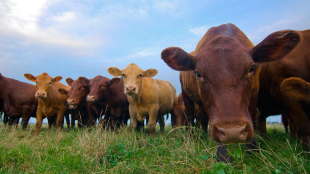 WIKIMEDIA, RYAN THOMPSON/US DEPARTMENT OF AGRICULTUREIn an effort to slow the problem of antibiotic resistance, the US Food and Drug Administration (FDA) announced new rules for farmers. No longer will farmers be able to give animals antibiotics to make livestock or poultry grow bigger. And if an antibiotic is needed to treat a sick animal, farmers will have to get a prescription from a veterinarian.
WIKIMEDIA, RYAN THOMPSON/US DEPARTMENT OF AGRICULTUREIn an effort to slow the problem of antibiotic resistance, the US Food and Drug Administration (FDA) announced new rules for farmers. No longer will farmers be able to give animals antibiotics to make livestock or poultry grow bigger. And if an antibiotic is needed to treat a sick animal, farmers will have to get a prescription from a veterinarian.
“With these changes, there will be fewer approved uses, and the remaining uses will be under tighter control,” Michael Taylor, deputy commissioner for foods and veterinary medicine at the FDA, told CNN.
The plan hinges on pharmaceutical companies complying with a request to change the labeling on their products. Drugmakers are asked to remove language from the labeling of antibiotics touting their growth-promoting qualities, but are not required to do so. “Once manufacturers voluntarily make these changes, the affected products can then only be used in food-producing animals to treat, prevent, or control disease under the order of or by prescription from a licensed veterinarian,” according to the FDA.
Some, including the American Meat Institute and the Animal Health Institute, support the move. Clinton Lewis, ...





















